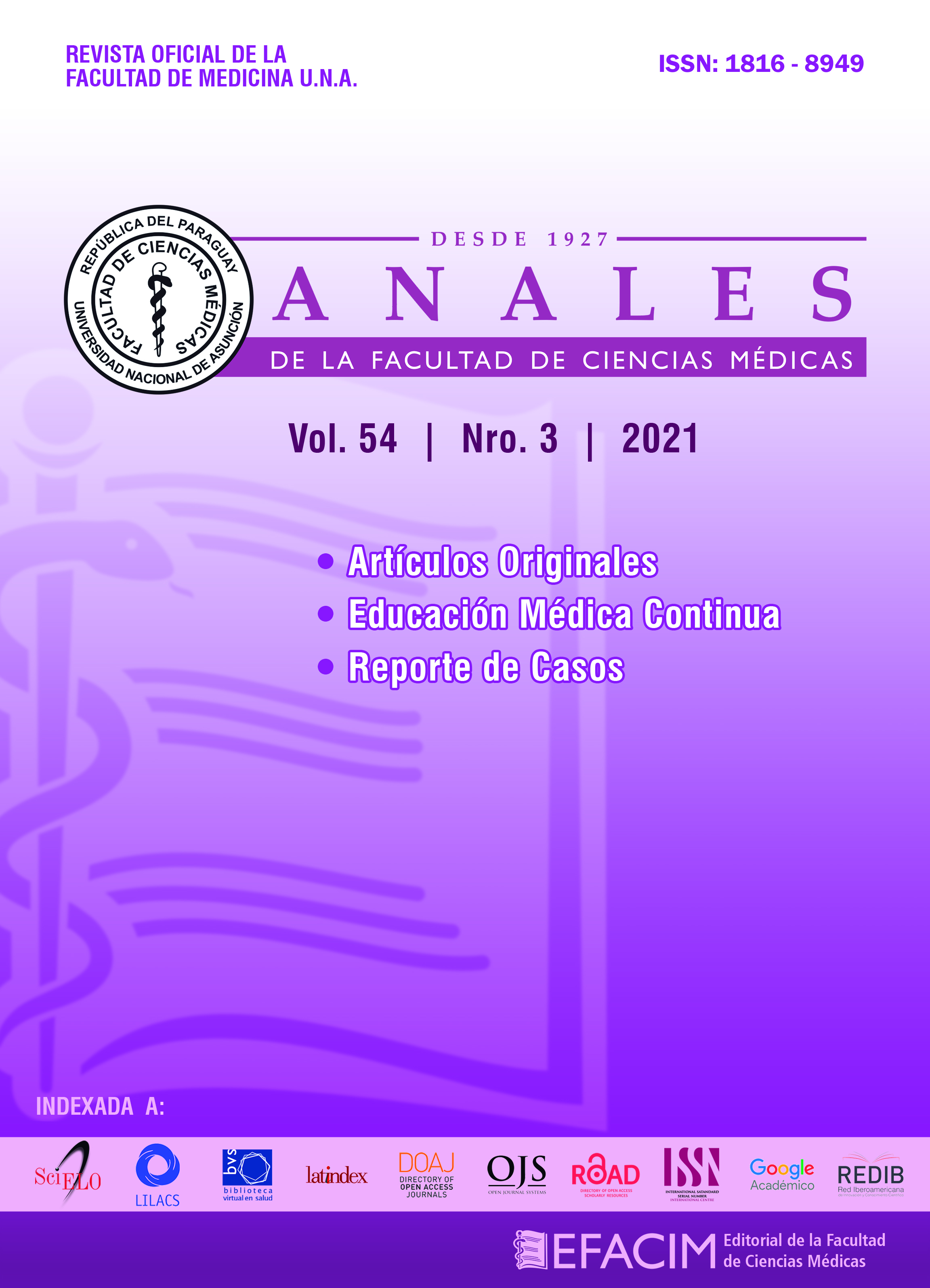Attitudes towards the COVID-19 vaccine in the general paraguayan population
Resumen
Introducción: la pandemia de COVID-19 ha provocado cambios que afectan a los sistemas
sanitarios y al enfoque de las enfermedades infecciosas en todo el mundo. La esperanza de
recuperar un cierto nivel de “normalidad” depende del desarrollo de vacunas. Objetivos: el objetivo
de este estudio fue describir las actitudes hacia la vacuna COVID-19 en la población paraguaya,
explorando los factores que podrían abordarse para apoyar la campaña de vacunación contra el
SARS-CoV-2. Materiales y métodos: estudio transversal y descriptivo. Los participantes fueron
reclutados a través de una encuesta por Internet, difundida a través de las redes sociales, durante el
mes de marzo de 2021. Todos los participantes recibieron información completa sobre el objetivo del
estudio, la privacidad y el procesamiento de datos. Resultados: de los 2297 participantes, el 67,9 %
(n=1559) eran mujeres, el 49,9 % (n=1147) estaban empleados, el 89,1 % (n=2046) declararon tener
estudios universitarios y el 96,6 % (n=2218) eran de zonas urbanas. En general, 81,8 % (n=1879)
de los participantes declararon estar dispuestos a vacunarse contra la COVID-19 si hubiera una
vacuna disponible. Se encontró una relación significativa entre haber recibido la vacuna contra la
gripe y la intención de vacunarse contra la COVID-19 (p <0,0001), con una OR de 3,09 (95% IC
2,1-4,5). Conclusión: el porcentaje de participantes inclinados a vacunarse contra la COVID-19 es similar al de los que esperan recibir una inmunización adecuada gracias a la vacuna. El gobierno y las agencias de salud deben hacer un esfuerzo para proporcionar información precisa que responda a las preocupaciones de la gente sobre la vacunación, en cualquier nivel de la sociedad
Descargas
Métricas
Citas
Naumova EN. Public health response to COVID-19: the forecaster’s dilemma. J Public Health Policy. 2020;41(4):395-398. https://doi.org/10.1057/s41271-020-00252-z
Torales J, O’Higgins M, Castaldelli-Maia JM, Ventriglio A. The outbreak of COVID-19 coronavirus and its impact on global mental health. Int J Soc Psychiatry. 2020;66(4):317-320. https://doi.org/10.1177/0020764020915212
Torales J, Ríos-González C, Barrios I, O’Higgins M,González I, García O, et al. Self-Perceived Stress During the Quarantine of COVID-19 Pandemic in Paraguay: An Exploratory Survey. Front Psychiatry. 2020;11:558691. https://doi.org/10.3389/fpsyt.2020.558691
Sultana J, Mazzaglia G, Luxi N, Cancellieri A, Capuano A, Ferrajolo C, et al. Potential effects of vaccinations on the prevention of COVID-19: rationale, clinical evidence, risks, and public health considerations. Expert Rev Vaccines. 2020;19(10):919-936. https://doi.org/10.1080/14760584.2020.1825951
Carrion-Alvarez D, Tijerina-Salina PX. Fake news in COVID-19: A perspective. Health Promot Perspect. 2020;10(4):290-291. https://doi.org/10.34172/hpp.2020.44
Tapia L. COVID-19 and Fake News in the Dominican Republic. Am J Trop Med Hyg. 2020;102(6):1172-1174. https://doi.org/10.4269/ajtmh.20-0234
Finney Rutten LJ, Zhu X, Leppin AL, Ridgeway JL, Swift MD, Griffin JM, et al. Evidence-Based Strategies for Clinical Organizations to Address COVID-19 Vaccine Hesitancy. Mayo Clin Proc. 2021;96(3):699-707. https://doi.org/10.1016/j.mayocp.2020.12.024
Kaufman KR, Petkova E, Bhui KS, Schulze TG. A global needs assessment in times of a global crisis: world psychiatry response to the COVID-19 pandemic. BJPsych Open. 2020;6(3):e48. https://doi.org/10.1192/bjo.2020.25
Krantz JH, Dalal R. Chapter 2 - Validity of Web-Based Psychological Research. En: Birnbaum MH. Psychological Experiments on the Internet. Cambridge, Massachusetts: Academic Press; 2000. p. 35-60. https://doi.org/10.1016/B978-012099980-4/50003-4
Gosling SD, Vazire S, Srivastava S, John OP. Should we trust web-based studies? A comparative analysis of six preconceptions about internet questionnaires. Am Psychol. 2004;59(2):93-104. https://doi.org/10.1037/0003-066X.59.2.93
Muñoz Navarro SR. How many subjects do I need to power my study?. Medwave. 2014;14(6):e5995. https://doi.org/10.5867/medwave.2014.06.5995
Neumann-Böhme S, Varghese NE, Sabat I, Barros PP, Brouwer W, van Exel J, et al. Once we have it, will we use it? A European survey on willingness to be vaccinated against COVID-19. Eur J Health Econ. 2020;21(7):977-982. https://doi.org/10.1007/s10198-020-01208-6
Yoda T, Katsuyama H. Willingness to Receive COVID-19 Vaccination in Japan. Vaccines (Basel). 2021;9(1):48. https://doi.org/10.3390/vaccines9010048
Gan L, Chen Y, Hu P, Wu D, Zhu Y, Tan J, et al. Willingness to Receive SARS-CoV-2 Vaccination and Associated Factors among Chinese Adults: A Cross Sectional Survey. Int J Environ Res Public Health. 2021;18(4):1993. https://doi.org/10.3390/ijerph18041993
Yang F, Li X, Su X, Xiao T, Wang Y, Hu P, et al. A study on willingness and influencing factors to receive COVID-19 vaccination among Qingdao residents. Hum Vaccin Immunother. 2021;17(2):408-413. https://doi.org/10.1080/21645515.2020.1817712
Harapan H, Wagner AL, Yufika A, Winardi W, Anwar S, Gan AK, et al. Willingness-to-pay for a COVID-19 vaccine and its associated determinants in Indonesia. Hum Vaccin Immunother. 2020;16(12):3074-3080. https://doi.org/10.1080/21645515.2020.1819741
Reiter PL, Pennell ML, Katz ML. Acceptability of a COVID-19 vaccine among adults in the United States: How many people would get vaccinated? Vaccine. 2020;38(42):6500-6507. https://doi.org/10.1016/j.vaccine.2020.08.043
Borriello A, Master D, Pellegrini A, Rose JM. Preferences for a COVID-19 vaccine in Australia. Vaccine. 2021;39(3):473-479. https://doi.org/10.1016/j.vaccine.2020.12.032
Rodriguez-Morales AJ, Franco OH. Public trust, misinformation and COVID-19 vaccination willingness in Latin America and the Caribbean: today’s key challenges. Lancet Reg Health Am. 2021;3:100073. https://doi.org/10.1016/j.lana.2021.100073
Argote P, Barham E, Daly SZ, Gerez JE, Marshall J, Pocasangre O. The shot, the message, and the messenger: COVID-19 vaccine acceptance in Latin America. NPJ Vaccines. 2021;6(1):118. https://doi.org/10.1038/s41541-021-00380-x
Palamenghi L, Barello S, Boccia S, Graffigna G. Mistrust in biomedical research and vaccine hesitancy: the forefront challenge in the battle against COVID-19 in Italy. Eur J Epidemiol. 2020;35(8):785-788. https://doi.org/10.1007/s10654-020-00675-8
Fisher KA, Bloomstone SJ, Walder J, Crawford S, Fouayzi H, Mazor KM. Attitudes Toward a Potential SARS-CoV-2 Vaccine: A Survey of U.S. Adults. Ann Intern Med. 2020;173(12):964-973. https://doi.org/10.7326/M20-3569
Sanche S, Lin Y, Xu C, Romero-Severson E, Hengartner N, Ke R. High Contagiousness and Rapid Spread of Severe Acute Respiratory Syndrome Coronavirus 2. Emerg Infect Dis. 2020;26(7):1470-1477. https://doi.org/10.3201/eid2607.200282
Guidry JPD, Laestadius LI, Vraga EK, Miller CA, Perrin PB, Burton CW, et al. Willingness to get the COVID-19 vaccine with and without emergency use authorization. Am J Infect Control. 2021;49(2):137-142. https://doi.org/10.1016/j.ajic.2020.11.018
Kreps S, Prasad S, Brownstein JS, Hswen Y, Garibaldi BT, Zhang B, et al. Factors Associated With US Adults’ Likelihood of Accepting COVID-19 Vaccination. JAMA Netw Open. 2020;3(10):e2025594. https://doi.org/10.1001/jamanetworkopen.2020.25594. Erratum in: JAMA Netw Open. 2020;3(11):e2030649.
Goldman RD, Marneni SR, Seiler M, Brown JC, Klein EJ, Cotanda CP, et al. Caregivers’ Willingness to Accept Expedited Vaccine Research During the COVID-19 Pandemic: A Cross-sectional Survey. Clin Ther. 2020;42(11):2124-2133. https://doi.org/10.1016/j.clinthera.2020.09.012
Lin Y, Hu Z, Zhao Q, Alias H, Danaee M, Wong LP. Understanding COVID-19 vaccine demand and hesitancy: A nationwide online survey in China. PLoS Negl Trop Dis. 2020;14(12):e0008961. https://doi.org/10.1371/journal.pntd.0008961.






